PROVINCETOWN — The Outer Cape economy is built on hospitality, yet few of its jobs are as intensely and relentlessly customer-focused as the restaurant host. For hours on end, these keepers of the front of the house perform a kind of magic, squeezing out seats for a party with two extra guests or calming a “hangry” patron with a cocktail or a seat at the bar.
Mac’s Shack
MEET THE MAKER
Paul Suggs Gives the Old Lobster Hutt’s ‘Tweet’ a Face-Lift
In those days, ‘you could just do stuff like that’
WELLFLEET — Before there was a Mac’s Shack, which is to say before there was butter-poached lobster on fresh corn risotto, there was the Bayside Lobster Hutt. It was Joe Francis’s place, good for a steamed lobster served with a pair of shell crackers and a bag of potato chips.
Francis first opened the Hutt on Route 6, but in 1971 he had the chance to move into the Crocketts’ old boat house on Commercial Street downtown. Francis died in 1993, but his memory lives on in the form of a paper-mache fisherman, made in his likeness, pulling a giant lobster into a dory that’s balanced on the roof at the Shack.
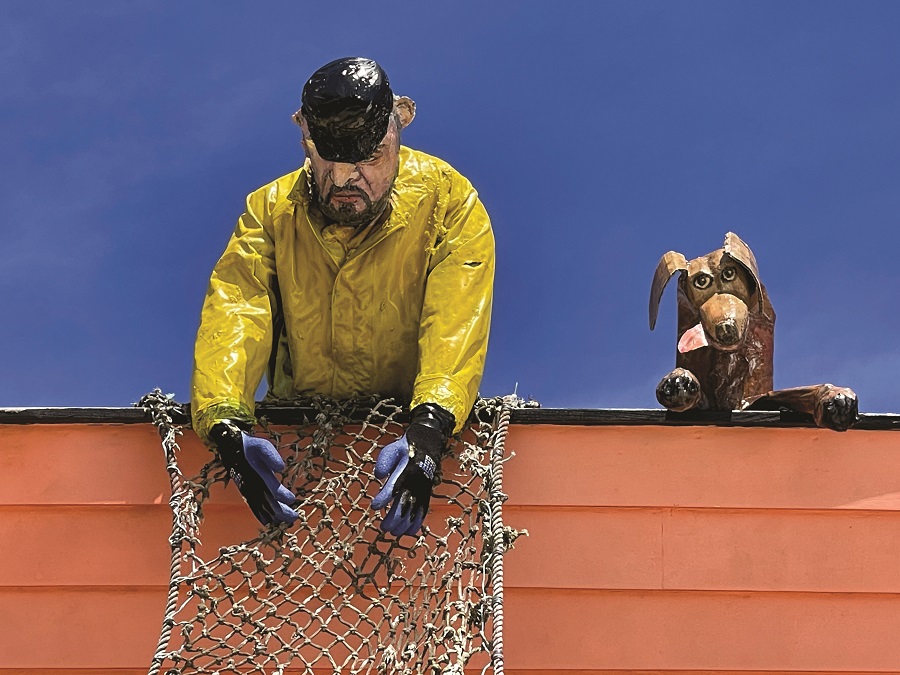
“There was an art gallery there, and before that Ye Olde Helpee Selfee Laundry,” says Paul Suggs, who helped Francis get set up in his new digs, starting with jacking up the stone floor to try to get it level. They didn’t entirely succeed, Suggs admits: “There’s only so much you can do.”
The Hutt needed signs, and Suggs was the one Francis turned to for that. “I used to have a little gallery down on Mayo Beach Road,” Suggs says. “Back then, I was carving totem poles.” Francis noticed those poles, and the two struck up a friendship and started oystering together.
The oystering worked out. The totem pole shop did not, although, Suggs says, “I think Peter Frawley got a couple.” You won’t find them on display anywhere. “They rotted,” says Suggs.
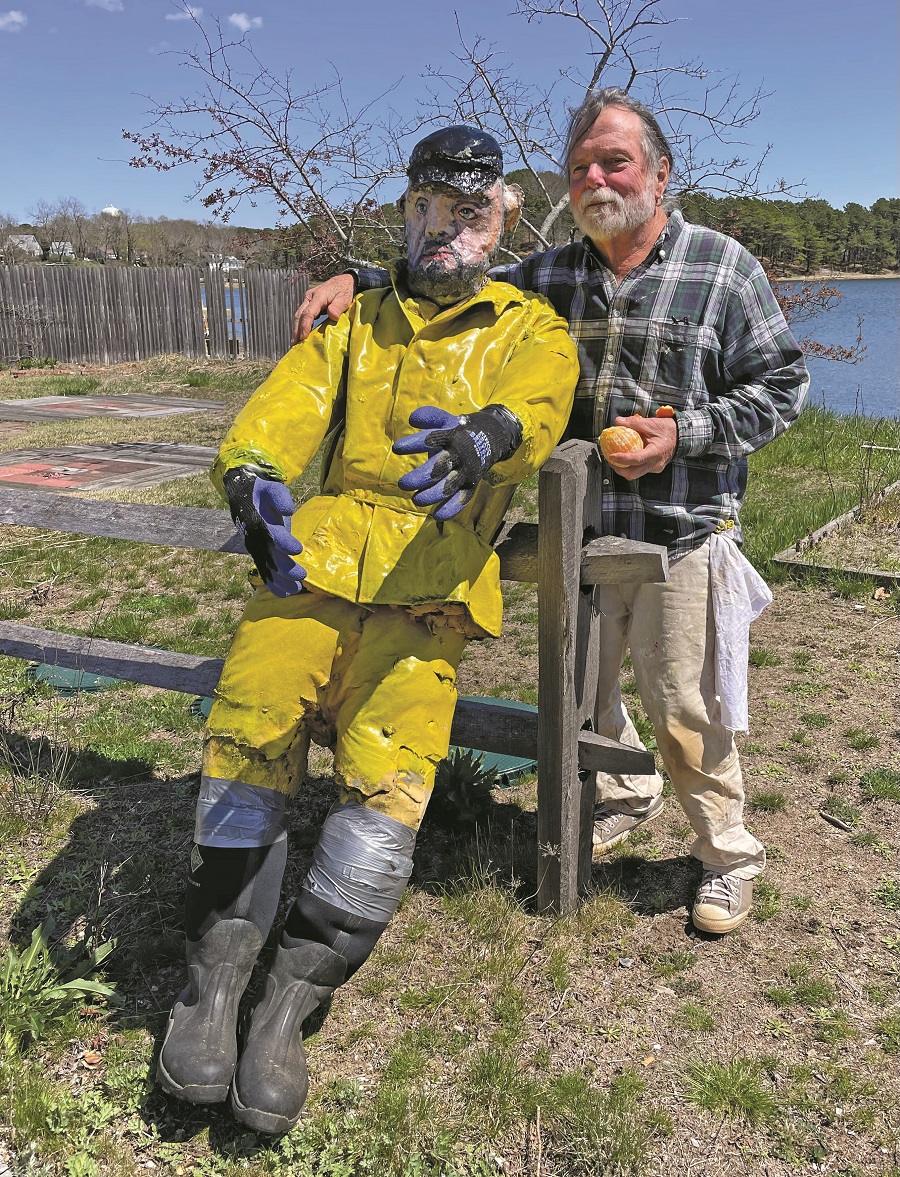
After the usual kinds of signs reading “Lobsters” and “Hot Dogs” were painted, “Joe got an idea he wanted a boat up on the roof,” says Suggs. And one day, when the two were picking up lobsters in Westport, they found just the one.
“It was a double dory, and its hull was smashed, so it was free,” says Suggs. He rebuilt it, welded a bedframe into a brace, and drilled that into the rafters. To get the boat up there, they dug a hole, rigged up a telephone pole, and used a rope tied to a fuel truck to hoist it to the roof. “Homemade block and tackle,” says the former totem-pole maker.
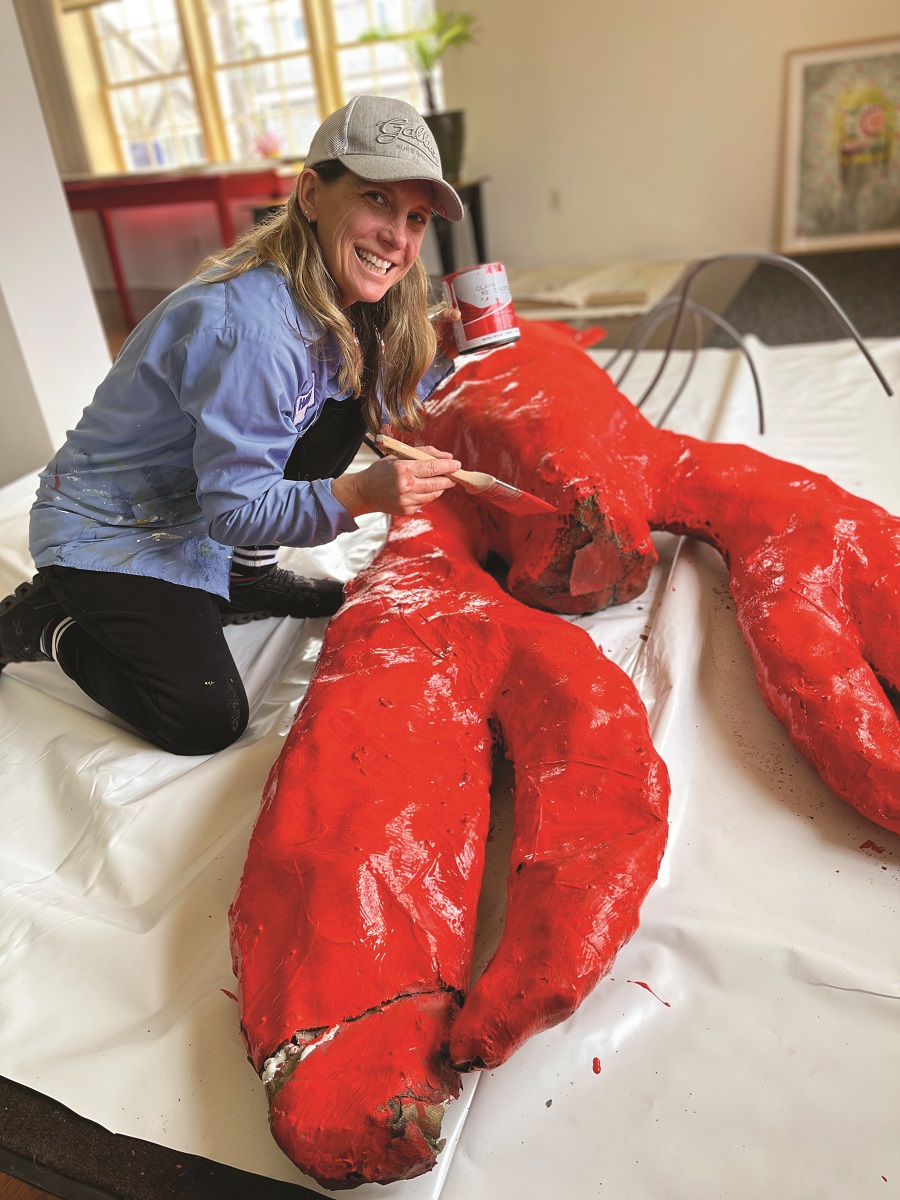
Did they have a permit? “What’s a permit?” says Suggs. “Joe and I, we had these crazy ideas. At that time, you could just do stuff like that. Nobody cared, and everybody agreed it added character to the place.”
It was Suggs’s idea to put Tweet in the boat. “Tweet” was what people called Joe, says Suggs. “His grandkids were trying to call him ‘Sweetie’ ” — an odd nickname for a man known around town as a no-nonsense and sometimes irascible Cape Codder. “But they knew better,” says Suggs.
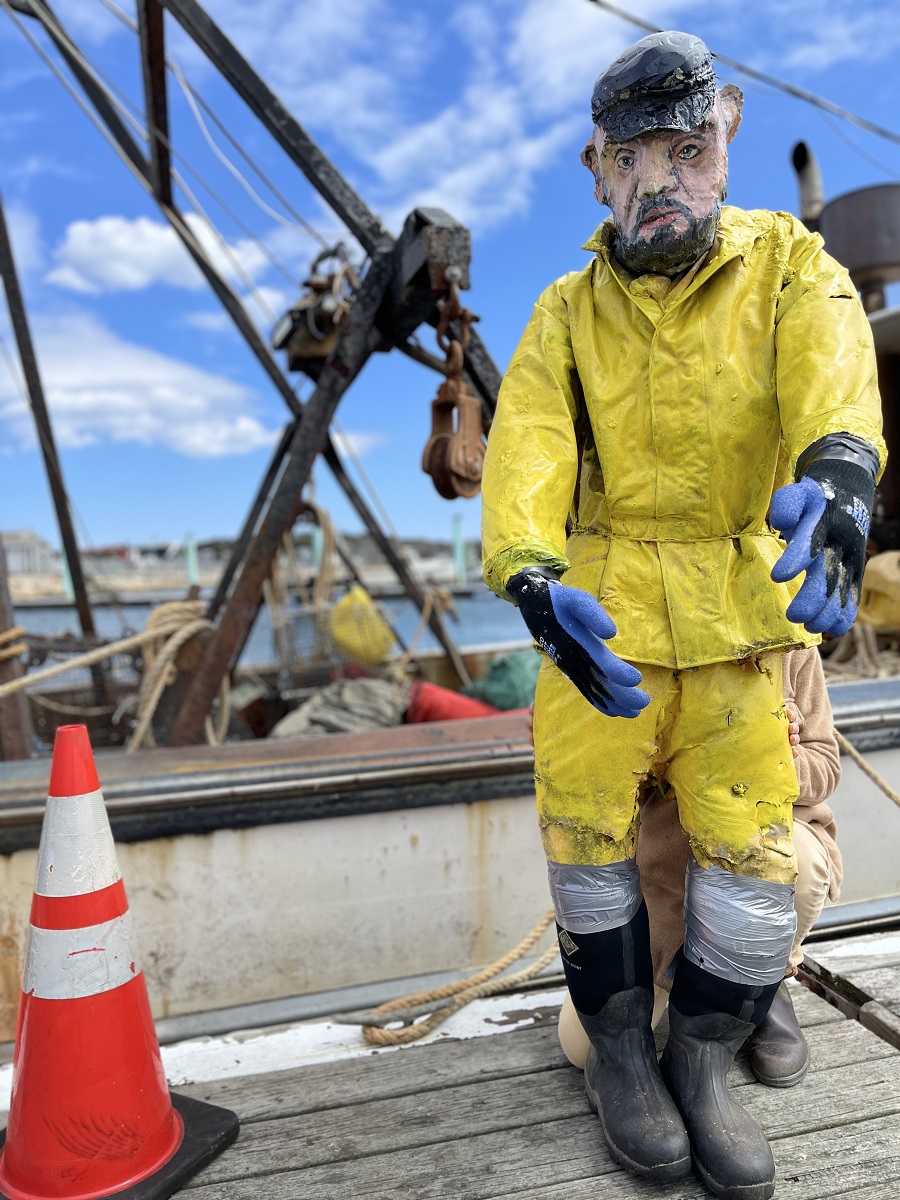
Francis and Suggs had other projects. The paper-mache clam that Suggs still pushes at Wellfleet’s 4th of July parade is the same one Francis used to push.
“I had a squirting horseshoe crab,” Suggs says, “but somebody stole it. So, after Joe was gone, I took the reins.”
Traci Harmon-Hay asked Suggs to give Tweet an overhaul this spring. He has reworked the paper-mache a few times over the last 50 years, he says, painting fiberglass over Tweet’s hat and oil gear, face, and hands. “Those hands are tough to keep on,” Suggs says. “I gave him a new pair this year.”
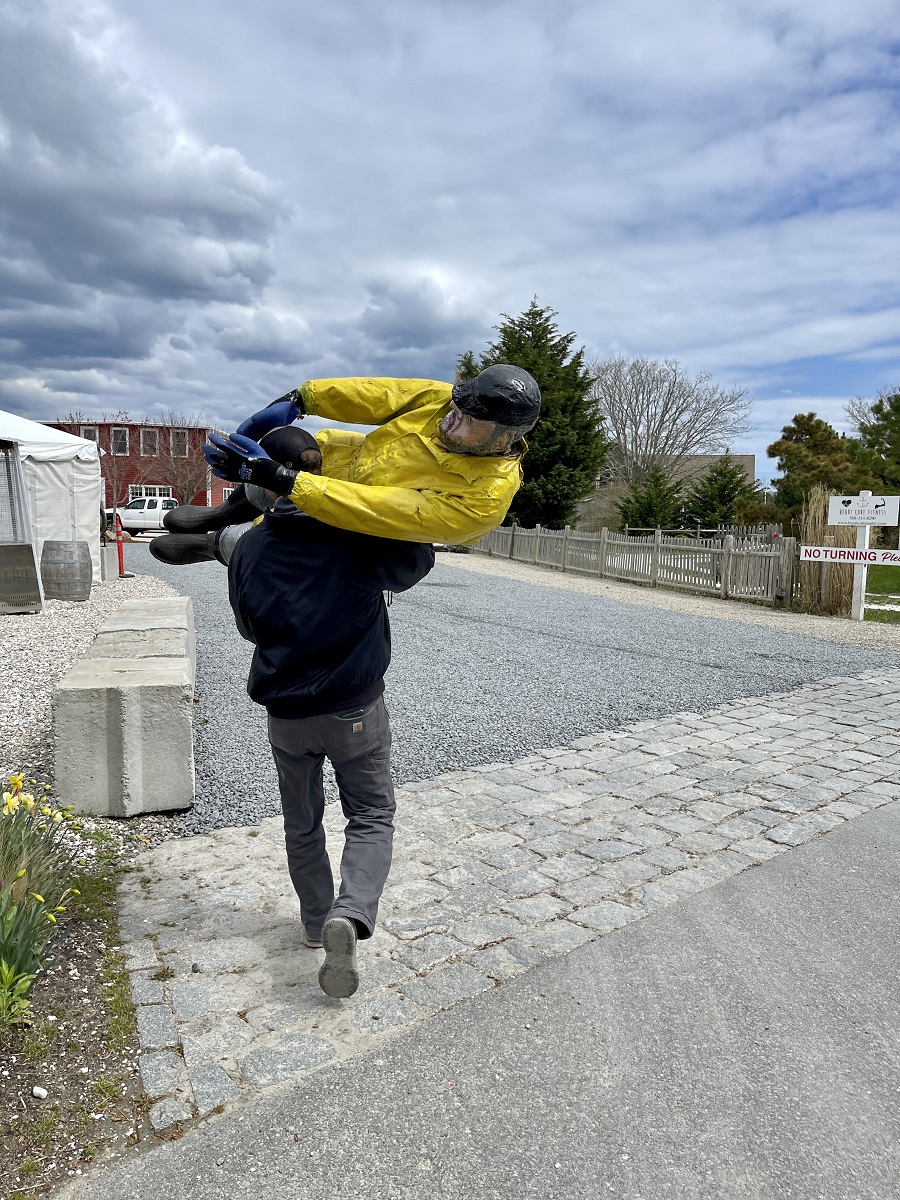
This time, as Tweet was lifted into place, he had company. “I’ve had this idea of putting a dog up there for years,” Suggs says. After Mac Hay gave him a thumbs up, he carved a skull out of a buoy, paper-mached a pair of his wife’s tights, and added a layer of fiberglass to a fisherman’s friend.
“It was time to give Joe some company,” says Suggs. “I worried he might have gotten lonely up there all those years.”
He says he did it for the same reasons Joe Francis put a boat on top the building: “It was a draw. People would take pictures of it. But really, we did it for fun.”
THE HALF SHELL
Six Tips From Behind the Raw Bar
It takes leverage, not brute strength, to shuck a Wellfleet oyster

WELLFLEET — Lili Hay has been shucking oysters since she was seven years old, though she says her technique has evolved since then. “My dad taught me,” she says. “But also Jimmy Vassel and others at the raw bar at Mac’s Shack — because everybody has a little different way of doing it.”
Now a senior at Nauset Regional High School, Hay has worked a lot of different jobs at her family’s businesses — scooping ice cream, running food, working in the fish market. “Maybe what I’ve liked best,” she says, “is staying late and seeing all the work that happens after a restaurant closes for the night.”
Last Wednesday, Hay gave a photographer a lesson in shucking “the best oysters in the world.”
“It’s so satisfying to be able to eat something so fresh, right from the ocean,” she says. The hardest step, Hay adds, flipping over another oyster, is the last one: “Put the oyster on ice and do not eat it until you’ve shucked enough for everyone.”


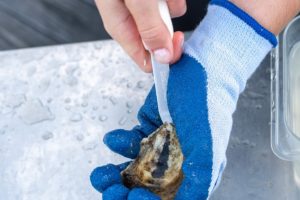
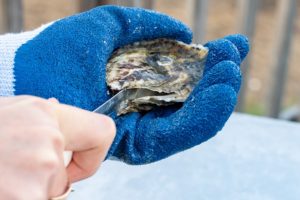
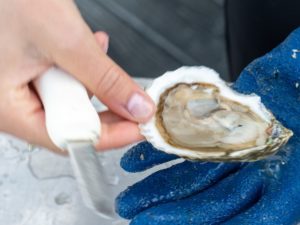
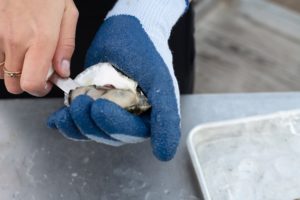
RE-USE
Modern Business Can Co-Exist With History
‘These buildings have a story to tell’
WELLFLEET — Mac Hay was standing at the sushi bar in his restaurant, Mac’s Shack, on Duck Creek. In the quiet of a preseason day, he paused to run his hand over the old wood. The bar was fashioned from wide pine boards that originally were part of the third-floor ceiling.
“We did it to be frugal,” Hay said. “We were reusing what we could.”
Since then, he’s come to appreciate being in a place made from timbers cut two centuries earlier. “I think there is a connection between food and place,” he said. “It adds a sense of authenticity. There is such a history in Wellfleet with oysters.”
The building at 91 Commercial St., constructed in the 1850s, was a favorite stop for 19th-century mariners.
“It was a marine hardware store,” Hay said. “There was a dock outside and boats would pull right up.”
Over the last 170 years, the building housed a general store, Ye Old Helpee Selfee Laundromat in the 1950s and 1960s (ultimately shut down by environmental officials for polluting Duck Creek), and the Bayside Lobster Hutt.
Hay rented the building and opened his restaurant in 2006. He purchased the property with investors seven years later. As his business has grown — it now includes restaurants and markets from Provincetown to Dennis — he has continued working with old buildings when he can.
Hay loves the quirkiness of the Shack and admires the ingenuity of those who built it. “Nothing is plumb or square,” he said. Demonstrating how the floor on the second level bounces slightly, he pointed to heavy rope cables secured to beams in the roof above. “Those hold the floor up,” he said. “They did all sorts of weird things.”

Hay and his partners also own what locals call the Mooney building, next door at 95 Commercial, which has its own history. According to the Mass. Historical Commission’s database of cultural resources, the structure originally housed the Cummings and Howe Pants Factory in the late 19th century. It became a shirt factory, then a steel die factory, according to the database information, provided by the Wellfleet Historical Commission in 1983. In the 1980s, it was the Mooney family’s fuel and grain store.
Hay now has his main offices there and rents space to other businesses. Up until this year, it also housed the Harmon Gallery, owned by Hay’s wife, Traci Harmon-Hay.
A train depot used to sit between the two buildings, Hay explained. Trains supported a burgeoning tourist industry in the late 19th century.
“The fact that these buildings have a story to tell” is the main reason Hay now owns two other historic buildings in Wellfleet, he said. “Although preserving in-town housing units has helped us,” he added. One, at 361 Main St., which dates to 1866, has a store on the main level with employee housing above. An 1850s house at 170 Mill Hill Road is used for employee housing.
“But maintaining a historic building isn’t easy,” said Hay. The work is continuous, “and you end up becoming a steward of something for the long run.”
In the not-too-distant future, he will have to address climate change issues. The building is in the floodplain. “You’re talking about lifting a historic building 3½ to 4 feet in the air,” he said.
It would be cheaper to tear down and replace the old buildings, but preservation has become more important to Hay, and he loves the challenge.
“It’s preserving history while bringing everything into the 21st century.”
THE COVID EFFECT
Rumors Swirl Over Closing of Restaurants
What were the test results? Answers are not required
Rumors started to circulate last week that a rash of Wellfleet restaurants had closed due to positive Covid-19 tests among staff.
According to public notices from restaurateurs, Mac’s Shack closed for 24 hours for a deep cleaning on July 30 after a staff member tested positive; the Fox & Crow shut down voluntarily for deep cleaning on July 30 and 31, though no staff tested positive; and Van Rensselaer’s closed for deep cleaning on July 31 and Aug. 1, without stating why. Mac’s and the Fox & Crow declined to comment for this article, and V.R.’s could not be reached before deadline.
(A July 27 article by Derek Thompson in The Atlantic argued that “deep cleaning” to prevent Covid transmission is a waste of time. Calling the practice “hygiene theater,” he cited research evidence that surface transmission of the virus is exceedingly rare, and that news reports of studies showing the virus remaining alive on surfaces for days were wildly exaggerated.)
The Wellfleet closings followed others in Provincetown. According to public statements by George’s Pizza and Provincetown Brewing Co., each had a staff member test positive for the coronavirus.
To verify such statements and halt false rumors, is there any official way to find out which restaurants have had employees with the virus?
The answer is no. In Provincetown, Wellfleet, and Eastham, local health officials are not naming restaurants with Covid cases. There is no state mandate for reporting. Emily Beebe, Truro’s health director, said on Tuesday that she was still pondering the question.
Elsewhere in the state, Quincy Mayor Tom Koch posts highly specific updates. On Aug. 3, he wrote: “An employee of Manet Lunch at 1099 Sea St. Quincy has tested positive for Covid-19. If you were a patron on 7/11/20 5PM-1AM, 7/12/20 12-5PM, 7/18/20 5PM-1AM or 7/19/20 12-5PM, please call Quincy Health Department at 617-376-1286 or 617-376-1272 so we may advise you regarding further actions.”
Morgan Clark, Provincetown’s director of health and environment, has no intention of naming restaurants because she does not want to “contribute to shaming,” she said. “This community should be more aware than most, given how we lived together in the 1980s,” she added, referring to the AIDS epidemic.
According to Mass. Dept. of Public Health epidemiologist Hillary Johnson, when and where a person worked may not be relevant. That is something contact tracers attempt to deduce.
“There is not a one-to-one correlation with work and infections,” Johnson told the Provincetown Select Board on Monday. That is, roommates, family, or a certain dinner party guest may need to be informed of positive test results, not a business where masks were worn.
Requiring Disclosure
Still, some are pushing for mandatory restaurant disclosures of positive tests among staff.
“Shining lights on the actual facts is the way to dispel the rumor mill,” said Louise Venden of the Provincetown Select Board. “I want to thank those who did disclose.”
Erik Borg, co-owner of the Provincetown Brewing Co., said it posted results on social media because “some story will get out there anyway, so why not get the real story?”
Provincetown Select Board member Lise King is advocating that the town list both the numbers of residents and workers employed in Provincetown who test positive. Particular businesses would not be named, said King, but it would give the public notice.
In Wellfleet, Mike DeVasto, chair of the select board, is pushing for full disclosure. “I feel strongly that restaurants should report if they have a case,” he said.
Beebe, Truro’s health agent, said naming the restaurant could motivate owners to focus on mask and hygiene requirements. But, she added, she doesn’t want to discourage businesses from communicating freely with her department.
In Wellfleet, Health Director Hillary Greenberg-Lemos said she depends on businesses to call her about positive tests, since there has been at least one significant lag in results going to the state.
Which Test Is Valid?
But testing itself presents a number of thorny questions. For one, which test is valid? The molecular test that’s covered by insurance at Outer Cape Health Services is the most reliable, but wait times for results have been a week or longer. (Quest Diagnostics claimed on Aug. 3 on its website that the wait time is now five days on average.)
Meanwhile, should a restaurant close, or should only a few employees stay home until results come in?
On his business website, Mac’s Shack owner Mac Hay stated that he learned on July 30 that an employee tested positive. “Following dept. of public health and local board of health directions and protocol, we closed for a deep cleaning and had staff tested,” the statement continued. “All tests came back negative. We believe the negative test results are a testament to following proper guidelines and mitigating risk whenever and wherever possible.” The tests were done at CareWell Urgent Care, with results back that same day for about $160 each.
Health agents, including Clark and Eastham’s Jane Crowley, said they don’t recommend the rapid tests, for which negative results are only about 70 percent accurate. Yet many businesses use the rapid tests anyway. “A lot of times, by the time they get to me, business owners have already gone to CareWell, spending almost $200 a test to do something I wouldn’t even recommend,” Clark said.
On the other hand, the week or longer lag in receiving molecular test results presents a huge problem for contact tracers and businesses. And there’s no easy solution, since Quest Diagnostics, which conducts the virus tests here, is backed up, due to high demand nationally and a lack of supplies, Clark said. Dr. Andrew Jorgensen, medical director of Outer Cape Health Services, said a shortage of plastic has made it difficult to get test pipettes.
Quest’s website says demand has “plateaued” and wait times on test results should decrease.
On July 31, the Provincetown Board of Health sent a letter to the Mass. Dept. of Public Health demanding 48-hour test results. Clark brings it up during every call to the DPH.
“We’re not going to stop talking about it until it is improved,” she said.
THE HAIL MARY
For Some, Outdoor Alcohol May Save Season
Wellfleet chiefs support restaurant plan
WELLFLEET — The Beachcomber, the Pearl, and Mac’s Shack will ask the select board on June 9 to be allowed to serve alcohol outdoors. Each restaurant hopes to set up tables in its parking lot.
In a normal year, the state’s Alcoholic Beverages Control Commission (ABCC) would also need to approve the outdoor service, a process that would take about eight weeks to complete. This year, it would have likely taken even longer, due to the enormous statewide demand for expanded outdoor seating. But on Monday, Gov. Charlie Baker signed an executive order granting local licensing boards the authority to approve outdoor alcohol sales.
This means the select board could grant the approvals on June 9.
Alcohol sales are crucial to the very survival of restaurants, which are already looking at fewer customers and reduced seating this year, said state Sen. Julian Cyr, whose parents owned the Truro restaurant Adrian’s.
“This is great news,” Cyr said. “What our business owners need right now is predictability.”
The Pearl, near the Wellfleet Marina, has a tent in its parking lot with a bar and tables, which would allow it to serve guests in the open air.
“People should be able to have wine with their lobster roll if they want to,” manager Allison Hester said.
The Beachcomber, at Cahoon Hollow Beach, is moving 12 indoor tables to the southwestern corner of its parking lot and adding a bar with an umbrella.
“With social distancing, everybody is seeing how important this is,” said Beachcomber owner Todd LeBart. “Serving alcohol is a big part of our business.”
Mac Hay, owner of Mac’s Shack on Commercial Street, sees serving liquor outside as a last resort to save the business.
“We are trying to make the most out of the worst situation, and this is an opportunity to just try to get open,” said Hay. “It’s a Hail Mary — we just throw it up there and, hopefully, we can catch it and keep moving forward.”
Without the license, Mac’s Shack will not be able to open at all, Hay said, as it would cost him more to staff the restaurant than he would make with reduced capacity.
A shuttered restaurant affects not just owners, staff, and customers but also local farmers and fishermen.
“The alternative to not opening?” There isn’t a good one, Hay said. “It’s devastating to everybody.”
Pending action in the state legislature became unnecessary when Gov. Baker issued his executive order allowing local licensing authorities — in Wellfleet’s case, the select board — to approve outdoor alcohol service without ABCC approval, until the order is rescinded or by Nov. 1.
There is local support for the idea. Wellfleet Fire Chief Richard Pauley has recommended serving food and alcohol outdoors during the 2020 season, pending review of the seating plan by local health and fire inspectors.
“As we all know, the summer business season on Cape Cod is very short, precarious, and unpredictable,” Pauley wrote to the select board last week. “I believe the approval of this measure would help to assist the restaurant/establishment owners in maintaining a viable business plan during this difficult economic time and provide for better public health and safety conditions in these establishments. I have discussed this with the health agent, building inspector, and police chief, and we are unanimous in this opinion.”
